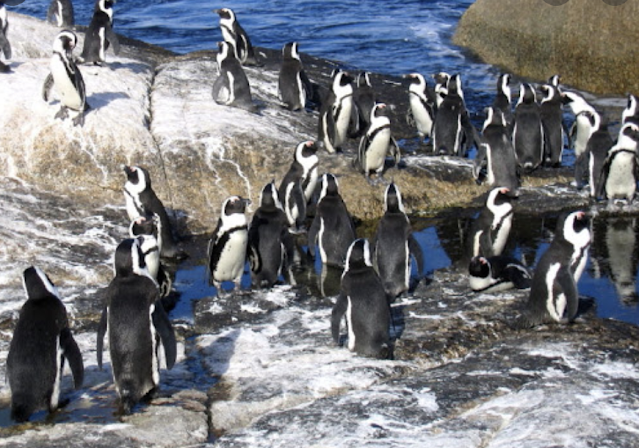The African Penguin
The African penguin (Spheniscus demersus) is an endangered species with a declining population. Their population size has declined by nearly 90% since the turn of the 20th century and the most recent census estimates fewer than 40,000 are left. Current estimates reveal that the species will go extinct by 2026 if current climate change and human activity trends continue!
Some basic facts about African penguins:
- They are one of the smallest penguin species
- Height: 24 to 27 inches
- Weight: 4.4 to 11 pounds
- Have a lifespan up to 30 years
- Flightless
- Excellent swimmers
- Fun fact: they can dive over 400 feet deep and hold their breath for over 2 minutes!
- Live in large colonies
African penguins are the only penguin species found on the African continent. They can be found along the rocky coastlines of Southwest Africa as well as many of the surrounding islands.
They play a large role in their ecosystem. They are an essential food source for other land and marine species. Their main predators in the water include sharks, seals, and whales. Their main predators on land include mongooses and domestic cats. On the contrary, they help balance the food chain by being a predator to other species such as anchovies, sardines, crustaceans, and blood parasites.
BUT......
There are many threats to the species and thus other species like those listed prior. The main causes of their decline include:
- Habitat loss
- From coastal development and climate change
- Pollution
- From oil spills and energy production and mining
- Over-fishing
- They have to compete with fishermen for fish
- Guano and egg collection
- Humans harvest their eggs for food and money
- Humans harvest guano for fertilizer
Why should we care?
Well, along with playing a large and important role in their ecosystem, the species also plays a significant role in the economy. In the past, they provided guano and eggs which supported the local economy greatly. However, both activities are illegal now given that they made the species go almost completely extinct. Today, they help the economy by being an attractant for ecotourism. They are favorable to tourists for two main reasons: they are the only penguin species on the African continent and tourists can get up close to them in their natural habitat.
- The few remaining breeding colony sites have been converted into nature reserves and national parks.
- The collection of guano and eggs has been prohibited.
- Fishing has been prohibited in populous areas.
- Organizations such as the Southern African Foundation for the Conservation of Coastal Birds (SANCCOB) have been created to rehabilitate birds affected by oil pollution and spills.
- Ongoing research such as that from geospatial tools.
SO......
Hopefully by now you are asking yourself how you can help. Here are a few ways you can help African penguins:
- Spread awareness. This can be via mouth, Facebook, Twitter, email, letter, etc. The possibilities are endless!
- Support and/or donate to organizations. Support your local zoo and if you can, make monetary donations to organizations supporting conservation efforts of African penguins like the South African Foundation for the Conservation of Coastal Birds (SANCCOB), the Dyer Island Conservation Trust, and the South African Marine Rehabilitation and Education Centre (SAMREC).
- Sign petitions. Sign petitions to stop oil and gas exploration and drilling in the Arctic and other areas.
- Avoid penguin byproducts. Do not buy penguin eggs or fertilizers with guano.
- Adopt a penguin.You can adopt an African penguin and support global conservation work at the following link: https://gifts.worldwildlife.org/gift-center/gifts/species-adoptions/african-black-footed-penguin.aspx
Works Cited
“African Penguin.” Earth Day, 20 Feb. 2020, www.earthday.org/african-penguin/.
“African Penguin.” SANBI, 20 May 2018, www.sanbi.org/animal-of-the-week/african-penguin/.
“African Penguin.” San Diego Zoo Wildlife Alliance Animals and Plants, animals.sandiegozoo.org/animals/african-penguin.
"African Penguin." www.biologicaldiversity.org/species/birds/penguins/African_penguin.html.







Comments
Post a Comment